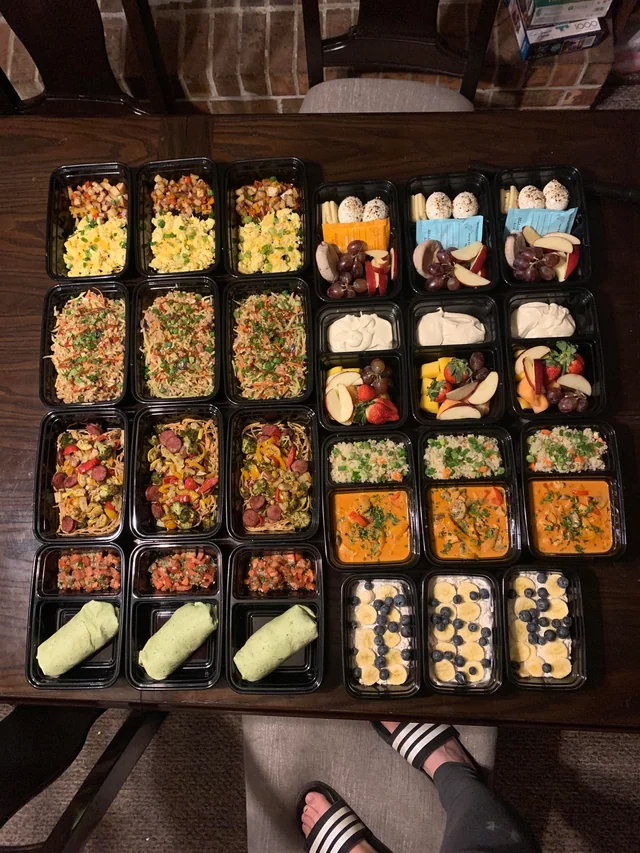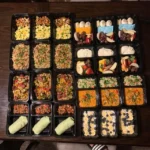How to Meal Prep on a Budget as a Practical Guide in advance can significantly save time, alleviate the stress of daily meal decisions, and help maintain healthy eating habits. However, if you’re working with a limited budget, you might think it’s expensive to do so.

In reality though, by using clever planning and resourceful techniques, it’s entirely possible to meal prep affordably while still enjoying nutritious and tasty dishes.
This blog post offers practical tips on How to Meal Prep on a Budget as a Practical Guide, helping you enjoy nutritious meals without overspending.
Plan Your Meals Around Sales and Discounts
Meal prepping can revolutionize your routine by saving time, minimizing the stress of daily meal planning, and helping you maintain healthy eating habits.
However, if you’re working with a tight budget, it might seem challenging at first.
Many believe that meal prep is expensive; however, with thoughtful planning and clever strategies in place, it’s entirely possible to prepare meals on a budget while still enjoying nutritious and delicious dishes.
This blog post will provide you with practical tips for meal prepping on a budget, helping you eat well without breaking the bank.
Buy in Bulk and Stick to Staples
Purchasing groceries in bulk can greatly reduce your expenses, particularly for non-perishable goods or items with extended shelf lives.
Essentials like rice, pasta, oats, canned beans, and lentils tend to be budget-friendly and adaptable, making them ideal for meal preparation.
By buying these staples in large quantities, you can create multiple meals without the need for frequent restocking.
Emphasize staple foods by incorporating budget-friendly options such as brown rice, quinoa, whole-wheat pasta, and legumes like beans and lentils into your meal plans.
These ingredients are excellent sources of carbohydrates and protein that can be creatively used in a range of dishes from soups to salads.
For proteins, think about buying frozen chicken, ground turkey, or large meat cuts in bulk that you can portion out.
Options like eggs and canned tuna are also cost-effective choices that offer a high-protein foundation for numerous meals.
Use Seasonal Produce
Fresh produce can be costly, particularly if you’re purchasing fruits and vegetables that aren’t in season.
To reduce expenses, concentrate on buying seasonal produce as it is usually more affordable and fresher.
Local farmers’ markets or grocery stores often provide in-season fruits and vegetables at lower prices.
Suggestion: Consider adding seasonal vegetables such as squash, broccoli, or leafy greens to your meal preparation.
These not only tend to be more cost-effective and flavorful but also supply essential nutrients.
Frozen fruits and vegetables serve as cost-effective alternatives.
Harvested at their peak ripeness, they are frozen to preserve nutrients, offering a healthy and budget-friendly choice for meal preparation.
Cook in Batches and Freeze Meals
Batch cooking is a highly efficient method for affordable meal preparation. By cooking large amounts of food at one time, you can reduce waste and maximize the use of your ingredients.
Furthermore, it helps prevent unnecessary purchases of snacks or meals during the week.
Action step: Select several recipes that are ideal for freezing, like soups, stews, chili, or casseroles. Once cooked, divide these meals into portions and store them in containers before placing them in the freezer.
This ensures you have convenient ready-to-eat meals available for hectic days ahead while reducing food waste.
Frozen meals can keep for weeks, and you’ll appreciate having them available when you’re short on time to cook.
Avoid Pre-Packaged or Pre-Chopped Foods
Convenience often has a cost. Opting for pre-chopped vegetables, pre-cooked grains, or individually packaged snacks usually means spending more compared to purchasing whole ingredients and preparing them yourself.
Although they save time, you’re essentially paying extra for the ease of use.
Action step: Dedicate some time to preparing your own ingredients. Opt for whole produce rather than pre-chopped vegetables, and dice them yourself.
This approach will not only save you money but also give you control over portion sizes while minimizing food waste.
Consider investing in reusable containers for your snacks and portioning out nuts, seeds, or fruits on your own instead of purchasing individually packaged snack packs.
Stick to Simple Recipes with Minimal Ingredients
Although gourmet recipes with exotic ingredients can be enjoyable, they often come with high costs and complexity.
Opting for straightforward recipes that use minimal ingredients is an effective way to maintain a budget and minimize time spent in the kitchen.
Emphasize simplicity: Opt for recipes with basic ingredients such as whole grains, lean proteins, and seasonal vegetables.
A straightforward stir-fry with rice, veggies, and chicken or a lentil soup featuring carrots and onions can be both satisfying and cost-effective while providing essential nutrients.
By concentrating on meals with fewer ingredients, you can reduce your grocery list and save money.
Repurpose Leftovers
A great way to save on meal prep is by utilizing leftovers.
When you prepare a large batch of food, consider how it can be transformed into various meals over the week. For instance:
Prepare meals with efficiency: By roasting a large batch of vegetables, you can repurpose them for salads, stir-fries, or wraps.
Similarly, grilling chicken breasts provides versatility—they’re great in sandwiches, pasta dishes, or grain bowls.
Transforming leftovers into new dishes saves both time and money while ensuring your meals remain diverse, preventing the monotony of eating the same thing daily.
Set a Weekly Grocery Budget and Stick to It
Establishing a budget prior to grocery shopping can prevent overspending.
Organize your meals around this budget, focusing on high-value ingredients such as beans, whole grains, and frozen produce for maximum savings.
Here’s a suggestion: Consider bringing a shopping list with you and adhering to it closely.
This will help prevent impulse purchases, especially if you’re on an empty stomach, which can often result in buying extra snacks or items that aren’t necessary.
Monitoring your spending over time can help you identify ways to reduce costs and maintain your budget in the long run.
Conclusion
How to Meal Prep on a Budget as a Practical Guide can be simple and affordable. With effective planning, easy recipes, and an emphasis on economical ingredients, you can savor tasty and nutritious meals without spending too much.
Shopping seasonally, purchasing in bulk, reusing leftovers creatively, and concentrating on staple foods will help you save both time and money while keeping up a healthy diet.
Budget-friendly meal prep not only promotes healthier eating habits, but it also minimizes food waste and maximizes your grocery usage.
Whether you’re planning meals for a week of lunches, dinners, or snacks, these tips will help you stay within budget without compromising on quality or taste.








